Don't wanna be here? Send us removal request.
Text
Ready or Not
Fair warning: I write with a lot of spoilers. So…spoiler alert.
Ready or Not (Matt Bettinelli-Olpin and Tyler Gillett, 2019) is a mystery/thriller that follows Grace (Samara Weaving) on the day of her wedding. She is about to marry into a family “richer than God,” and all she must do to be accepted into this family is play a randomly chosen game. Easy enough. However, when she unluckily draws the Hide and Seek card, the only bad card in the game, things take a turn for the homicidal. Basically, the family gets to hunt her. She spends her wedding night running and hiding from this group of maniacs that claim they need to kill her before dawn or else they will all die themselves.

If you’re a fan of The Purge films, this movie might be worth a watch. But even more so, as soon as I saw the trailer, I immediately got Get Out (Jordan Peele, 2017) vibes. In no way am I saying that Ready or Not even comes close to being as masterful as Get Out, but it definitely drew some inspiration from there. A young girl goes to her rich boyfriend’s family home, the family is creepy as hell and has some pretty dark secrets, they end up trying to kill her, she escapes a few times and is caught a few times, and her boyfriend eventually turns out to be a bad guy. I don’t know, you tell me.
This film had no problem with gore. Bullet to the face, arrow through the throat, or a skull being cracked, it wasn’t afraid to show the aftermath of a gruesome and fatal injury. I appreciate that. Most of the time they leave you wanting more when it comes to the gory stuff. Here, I almost wanted less. Almost.
Now this is more of a comment on the whole horror/thriller genre in general, but HEY. MAKE SURE THEY’RE DEAD. This film had no shortage of screaming-at-the-screen anger when it came to this. Multiple times Grace had the chance to kill several of the people trying to kill her and she just didn’t follow through. Mainly the scene when she strangles Stevens (John Ralston) in the field. GIRL. He dropped a gun right next to you. Shoot him.

My absolute favorite part about this movie was Samara Weaving. This is the first role I’ve seen her play and I thought she was brilliant. This part called for lots of hyperventilating, and one thing Samara is clearly quite good at is hyperventilating. She was the perfect amount of sassy and badass without ever coming off as annoying. Her reactions seemed really realistic given the situation. I was entirely convinced and enthralled by her performance and she gained a new fan in me. And watching her punch an eight-year-old in the face was fantastic.
Side note: Daniel’s character (Adam Brody) was another one I loved throughout this film. He was so dimensional and interesting and I was rooting for him.
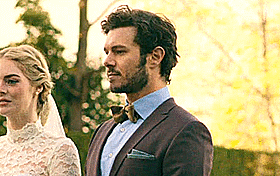
And since I can’t seem to get through a movie these days without one jarring complaint, here it is: that awful ending. It literally felt like an episode of Scooby-Doo (no disrespect to Scooby-Doo). The film wasn’t perfect, it had its faults, but up until the last five minutes, I was very impressed by it. More than I thought I would be. But then they ruined it. The curse ends up being real and, no joke, the family members just start exploding. I literally thought to myself, “oh fuck off.” I was so disappointed I couldn’t even find the words. AND, to top it all off, there was a ghost. It felt so cheap to me and so poorly written that I was genuinely disappointed.
I will give them this, the final shot of the film was beautiful, with Grace exiting the burning house in her now black and bloodied wedding dress and sitting down on the steps. That was well done.

Here’s my suggestion for an alternate ending, in case anyone anywhere cares:
The family kept saying that anyone who objected to playing the game ended up mysteriously dying the next morning. So, instead of having them literally explode, add a character here. Introduce a last-minute addition to the family. A bastard cousin that no one knows about that has been the game master all along, maybe following in his father’s footsteps before him, as this game has been going on for years. Explain that he goes to each wedding and makes sure the game is being played correctly, and if not, he kills the cheaters the next morning, making it seem like there is a curse. This scene could have been incredible. Cue the creepy music on the record player – which here is apparently put on by the ghost. Sigh. He walks in, tells them who he is and that he is here for them because they failed, gives them 100 seconds to hide, and then hunts them down one by one, eventually prevailing with ease because he is clearly a badass, leaving only Grace alive to see the aftermath. Now that is an ending I would’ve been proud of.
Lastly, here’s some of my questions/observations:
Aunt Helene (Nicky Guadagni) says that Alex (Mark O’Brien) is the only one that had actually seen this game creator in person, sitting in the chair. This is never explained. When did he see him? Was it the ghost? Last time there was a Hide and Seek game, Alex was locked in a closet. So why was this randomly brought up?
Alex’s betrayal of Grace really seemed to come out of nowhere for me. He was willing to do just about anything for her, including betraying his entire family even though he knew about the curse. Sure, watching her beat his mother’s skull in may be a game changer, but the last thing I expected was for him to completely turn on her. Maybe leave the house or call the family in to come grab her, but he was literally going to be the one to stab her in the heart. Guess he didn’t love her that much.
Where the hell did the “Hail Satan” chant come from...?

5 September 2019
#ready or not#samara weaving#adam brody#thriller#mystery#Film Review#film#films#movie review#movies#movie
6 notes
·
View notes
Text
Yesterday
I have words for this one.
I enjoyed Yesterday (Danny Boyle, 2019) significantly more than I thought I would. That being said, I hate wasted potential. And I think there was a lot of that here.
This film was heavily advertised as being about a man, Jack Malik (Himesh Patel), that gets into an accident and wakes up realizing that he is the only one left in the world that remembers The Beatles. However, this isn’t exactly true. Jack ends up meeting two other people that also remember The Beatles. There are also things other than The Beatles that have ceased to exist, including the band Oasis, Coca-Cola products, cigarettes, and all things Harry Potter. I am still confused as to what the relevance/correlation is between these things.

I took a bit of issue with the ending but I also didn’t totally hate it. Spoiler alert: nobody ever remembers. Life just goes on with three random people having memories that the rest of the world doesn’t. Throughout the whole film, I 100% expected it to end with everyone remembering or the entire thing to have been a dream while Jack was in a coma. I was surprised to see that the world just remained this way. The three redeeming things about everything not going back to normal were that (1) it wasn’t predictable, (2) John Lennon actually did get to live a full life, and (3) goodbye cigarettes.
Another thing I really hate when it comes to plot lines is forgotten characters. The two friends, Nick (Harry Michell) and Carol (Sophia Di Martino), disappear from the narrative about halfway through the film. They provided a few good laughs at the beginning and then really the only other time we see them is when Jack performs at the hotel. There was a lot of potential with them that was fumbled and not taken advantage of. Either write them out of the script or allow them to exist in it enough to be impactful.
My biggest complaint about this film was one wasted opportunity in particular: to have Jack sing Oasis’s “Wonderwall” to Ellie (Lily James). Jack performed this song in a talent show when he was young, which is brought up multiple times throughout the movie, and is also described as the moment that Ellie started believing in him as a musician. Considering Oasis was also one of the bands erased from the world, Jack could’ve easily made a grand gesture to Ellie by singing it to her. When Ellie expresses her love to Jack in his bedroom, she discloses her disappointment in not being one of the girls that he sings about. This could’ve been his moment to sing to her, letting her know that he cares about her. The film circles back to this single moment multiple times throughout for it to eventually have no real relevance at all. Why make Oasis cease to exist if it wasn’t going to have any point or relevance? Why put so much emphasis on the fact that he sang “Wonderwall”? Wasted potential.

However, this may have created a plot hole in the narrative. Would the memory of Jack at the talent show singing a song by Oasis, a band that doesn’t exist to her, just not be a memory in Ellie’s brain, or would she maybe remember him singing a different song? This could also have led to an arguably better ending. In that moment of him singing “Wonderwall” to her, Ellie could have remembered the past and all the things that had been erased from the world. Then everyone at Wembley could start remembering everything, and sing along to one last song (preferably “Hey Jude”). Sure, this sounds a bit cheesy, but I’m sure it could be tastefully done on screen.

Another possible ending – or perhaps change in plot line. The film could have made a statement about how The Beatles themselves – John, Paul, Ringo, and George – were why their songs worked. Jack could have failed and learned that fame and success came to them not only because of their songs, but because of them, their image and their personalities. Granted, this story line probably wouldn’t have gotten very far, or maybe they could’ve had Jack form a band and pay tribute this way.
As for the actors, I have (almost) no complaints. I thought Himesh Patel and Lily James were quite believable and had good chemistry. I never could complain about Kate McKinnon – she was the perfect mix of serious and hysterical, as always. Ed Sheeran almost became annoying, seemingly a hub for cheap laughs, but I get why they included him.
Overall, there was no big moment for me. No one moment that gave me the chills, or had me lost in a scene, or brought me to tears. I wouldn’t necessarily call myself a Beatles fan. Not that I don’t like their music, I just don’t know enough about them or their songs to really consider myself a fan. However, I know enough of their songs to recognize that this wasn’t a good enough acknowledgement of their legacy. I’ve heard better renditions by cover bands. For a movie about some of the greatest songs ever written, the emphasis was never focused enough on the music. There was so much potential for Jack’s performances at the hotel or Wembley to be moving and impactful, but again, it was wasted. I don’t think he ever even sang an entire song. I think of Bohemian Rhapsody (Bryan Singer, 2018) and how beautiful and moving Queen’s performance was at Wembley. That wasn’t relayed here. It didn’t have nearly the same energy. It never felt special, never peaked.

I will end on a positive note after all that. There were two redeeming scenes that stayed with me. When an elderly John Lennon opened the door, I got a rush of emotions. I hadn’t considered the possibility of seeing the lives of the band members in this alternate reality. It was a nice sentiment, to think he lived a long, happy life. Second is the scene when Jack meets the two other people that also have their memories intact. I was happily surprised when they told Jack that they were thankful, not angry. I think it really speaks to the legacy of their music – it doesn’t matter who’s singing it as long as people are hearing it.
P.S, The Summer Song. I don’t quite know how, but I know there is wasted potential there. Should’ve circled back around to that.
20 August 2019
#yesterday#the beatles#beatles#john lennon#paul mccartney#ringo starr#george harrison#film#filmreview#filmreviews#movie#movies#movie review#hey jude#danny boyle#ed sheeran#kate mckinnon#himesh patel#lily james
3 notes
·
View notes
Text
Jaws
Jaws (Steven Spielberg, 1975) tells the story of a large great white shark that stalks the Massachusetts island of Amity. Police chief Martin Brody (Roy Scheider) struggles to convince the mayor and the citizens of Amity of the danger that they face as the shark continues to attack people in the water. The tone, sounds, characters, and editing, make this film successful in creating a panic in its viewers.

From the very beginning, the tone of Jaws is clear: anxious. Between the music and the obviously stressful subject matter, the audience is left in fear throughout the entire film. Withholding the view of the actual shark until one hour into the movie increases this suspense and mystery, as the animal remains a hidden entity. The unseen and unknown creates fear. The tone is set in the first scene and remains the same until the last scene when the shark is finally killed. This anxiety is a staple of shark movies and even aligns with most horror movies. The predator stalks its prey while the rest of the people live in fear. Shark movies nowadays imitate the style that Spielberg sets forth in this film. He clearly has heavily influenced this genre. In almost all films about a shark, someone goes down in a shark cage, there are jump scares, and the shark is of a greater size than anyone has seen.

The most alarming noise in this film is the music that plays when the shark is present and lurking underneath the water. This quick paced, low rumble repeats, letting the audience know that danger is near. At the end of the film, when they attach the barrel to the shark, there is triumphant music. However, when they realize that this won’t work, the music slowly turns slow and menacing and eventually into that classic “Jaws” theme. Another noise that is a staple in this film is the splashing and screams that follow either when beach-goers think the shark is present or after an attack. These noises both induce anxiety as the panic ensues. Quint (Robert Shaw) even talks about screaming during his monologue on the boat, and how it attracts the sharks even more. The last important sound that is frequently heard in Jawsis the sharp noise that induces a jump scare. Usually during a silent scene, the shark will quickly appear accompanied by this sound, alarming the audience.
Martin Brody is a hopeless character in the first half of the film. No one takes his fears seriously, especially the mayor, who is only worried about losing money. Martin second guesses himself and follows orders. He is even blamed by many of the citizens of Amity and is very clearly hurt by this. He is empathetic with the people and only concerned with keeping everyone safe. It is clear that he is the only rational person. However, once his child is the one in danger after being face to face with the shark, he is determined to kill it. His fear of water and drowning is overcome by his commitment to catching the shark and he is the true hero in the end. Even more interesting is how Spielberg makes the shark a major character in Jaws. The shark’s point of view is seen multiple times, underwater looking up at the legs of swimmers in the water. This also increases anxiety as there are so many people in the water – and they are all targets.

For the most part, this film uses invisible editing. However, one very famous scene differs. Martin is at the beach worrying about the safety of everyone in the water, as he suspects there is a shark present. There are deterrents that fool the audience into thinking that the shark is attacking, such as a girl screaming in the water but is only being picked up by the boy next to her. Martin is clearly on edge and keeps glancing at the water. Then, a young boy is attacked by the shark. When the water fills with blood, everyone begins to scream and there is a medium close-up shot of Martin. Spielberg chooses to use a very interesting technique here – the dolly zoom. The camera zooms at the same time that the camera dollies backward, creating a disorienting and dizzying view of Martin. This iconic editing portrays what Martin is feeling in this very moment.

Spielberg’s Jaws set forth a standard in thriller shark films that is still present today. The anxious tone is amplified by the sounds, character, and editing, and is maintained from start to finish. This movie remains iconic thanks to Spielberg’s choices.
21 July 2019
#jaws#jaws film#jaws movie#martin brody#spielberg#steven spielberg#chief martin brody#shark#sharks#shark movie#film#filmreview#filmreviews#films#movie#movies#movie review
8 notes
·
View notes
Text
The Royal Tenenbaums
(TW: Suicide)
The Royal Tenenbaums (Wes Anderson, 2001) is a funky drama/comedy that is just as disorienting as it is heartening. The film follows Royal Tenenbaum (Gene Hackman), a deadbeat father that only reappears in the lives of his family members because he has run out of money. His character, along with the editing, mise-en-scene, and reflexivity, makes the film a work of art entirely its own.
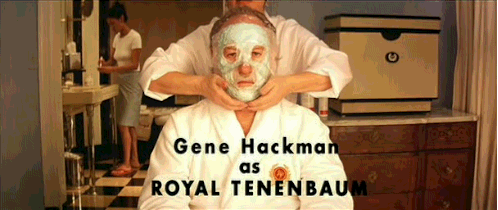
The title of this film is interesting because it has a double meaning. To label a family “royal” gives them a very prestigious, proper, and admirable feel. While the Tenenbaums are all quite brilliant, royal is not quite the way to describe them. This ironic adjective they’re given contrasts with what is actually a quite disheveled family. The second meaning, revealed quite early on, is the name of the main character. The movie does follow Royal Tenenbaum, but he is the ultimate outsider. He left his family to fend for themselves, then when he returns he is only accepted back in by his son Richie (Luke Wilson). To label the family by grouping them all together using his name shows that he is still the patriarch. Royal’s ploy to fake his illness does follow a classic plot line – that of a family member scheming to get back in their family’s good graces. He functions as the catalyst to bring the family back together, yet his character still brings a lot of meaning to the film. His disconnectedness comes to light when he states, “I want this family to love me.” In labeling them “this family,” he shows that he does not consider himself one of them. However, the close of the film reveals an interesting anecdote set forth by Royal. There is a shot of his gravestone, which reads, “died tragically rescuing his family from the wreckage of a destroyed sinking battleship.” What could be construed as one last silly joke played by Royal actually seems to be quite deeper than that. Each member of Royal’s family was suffering from extreme loneliness before he showed up. His role in the film was to pull them away from their troubles and make them reevaluate the choices they had been making. He quite literally saved them from their own wreckage.
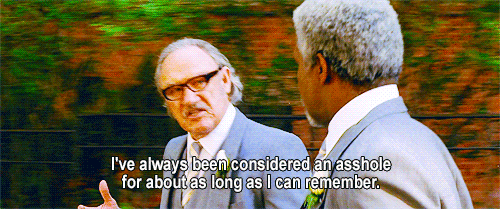
The editing throughout The Royal Tenenbaums is mostly invisible, apart from one scene in particular. When Richie decides to kill himself, there are quick cuts to images of Margot (Gwyneth Paltrow), his adopted sister whom he is in love with. This type of editing is used to reveal his inner thoughts. As he slits his wrists with a razor blade, he is thinking about her. The audience is given his motive solely through this editing technique. The scene is also silenced and instead has a song playing lightly in the background. When Dudley (Stephen Lea Sheppard) finds Richie covered in blood, he is seen screaming, but the scream is not heard. The music plays over this scene. Hearing the song playing in the background seems to make it less tragic and closer to romantic. Had viewers heard Dudley’s scream, it would immediately become alarming. Between the use of silence and the quick flashback editing, this solemn scene turns into an ode of his love for Margot.

Prior to watching this film, I had some ideas about what a Wes Anderson work would look like: colorful, busy, and highly stylized. I was delighted to be proven right, as this film mastered the art of mise-en-scene. Every frame is filled with things to look at, between the picture frames hanging on the walls, the character’s costumes, or the board games brimming the closet. The colors are vibrant and there are as many perfectly symmetrical frames as there are completely skewed ones. The characters live in this slightly off-kilter world which comes across in the way the scenes look. The attention to detail proves that everything seen in the movie is deliberate and pristinely designed.
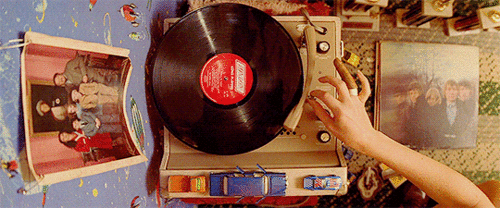
There are certain elements of this film that separate it from most others. First, the title sequence introducing the characters. I’ve seen very few films, if any, that have done something like this. Interrupting the narrative to remind viewers that the characters are actors playing a role is quite a bold move. It contributes to its self-consciousness, making it a reflexive film. Another moment that reiterates this reflexivity is when Royal is in the game closet. He is talking and looks right into the camera, as if speaking directly to the audience. Afterwards the camera shifts to reveal he was talking to a mouse, but in that moment, he broke the fourth wall. A third interesting element of The Royal Tenenbaumsis the inclusion of chapters, showing text from pages of a book. After a little research, I learned that this film actually isn’t based on a book and the novel pictured is entirely fictional. This is a fascinating, non-diegetic, addition to the film. It certainly adds an element of pomp to it - it almost begs to be taken more seriously simply because it seems to be based on a novel.
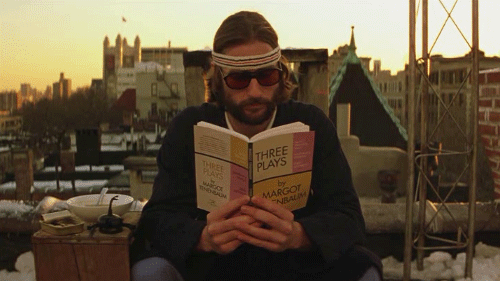
The Tenenbaum family is funny, bright, a bit inappropriate, and surely impossible to understand. Wes Anderson brought this to life in The Royal Tenenbaums, matching the way the film looks to the character’s personalities seamlessly. Each element allows the audience to not just view this film, but to experience it. The ending is slightly satisfying, but does not give the audience any sort of closure, allowing the Tenenbaums to remain enigmas.
14 July 2019
#royal tenenbaums#royal tenenbaum#gene hackman#owen wilson#luke wilson#gwyneth paltrow#wes anderson#wes anderson film#film#film review#filmreviews#filmmaking#movie#movies
27 notes
·
View notes
Text
Fargo
Fargo (Coen Brothers, 1996) is a film I’ve heard about quite often. I was unaware of the plot until reading the description and was surprised to find out that it was actually listed as a comedy. For such a dark story line to be considered funny was unexpected, especially being based on true events. Even at the close of the film, I was still was surprised by it being grouped with comedies. It had funny and quirky moments, but these were overshadowed by the multiple senseless deaths. However, the editing, static characters, and tone contributed majorly to this film’s individuality.

The characters are imperative to this film not due to their development but lack thereof. They’re static – they are the same people throughout the entire film and nothing that they come across changes that. The main character, Jerry Lundegaard (William H. Macy), is an idiotic mess. Even after his first scene, in which he reveals that he has hired two men to kidnap his wife so they could split the ransom money, there is a sense of sorrow for him. He’s in over his head, his father-in-law mistreats him, and he can’t seem to find success in anything he does. However, as the film goes on, viewers are shown that he really is just moronic. He hasn’t changed as a person, the audience has just been given more information about him. He is a bad liar and an even worse husband. On the other hand, Marge Gunderson (Frances McDormand) is quite likeable. Even through her goofy smile and constant appetite, she seems to be the only smart one in the whole film. From the beginning to the end, she latches onto her leads and is quick to figure out what’s going on.

There wasn’t anything too special about the editing in this film other than the fades. The scenes would often silently fade to black, or fade into another scene, creating a sense of closure that wasn’t actually there. Some scenes would only be a few seconds long and then fade away, making it seem like a pointless addition to the storyline. This actually had a pretty interesting effect because it almost made the scenes seem uninspired and dull, as if nothing special really happened, even if it did.
The only element of sound that felt especially important in Fargo was the character’s voices, particularly their accents. The way that they talked added an element of silliness. Often in film or on television, the Minnesota accent can unfortunately be aligned with stupidity. This seems to have been the filmmaker’s aim here. Their language adds to the anti-climactic and downplaying of the drama. After the man on the phone tells Jerry he’ll kill his entire family, he responds with “Okay, real good then,” and hangs up. After Jerry’s father-in-law gets shot in the stomach, he says calmly, “Oh jeez.” The lack of emotion in these scenes is confusing and is probably part of the comedic element that so many find within this movie.
The film’s tone is serious yet there is an underlying feeling of stupidity and indifference. The tone remains this way throughout the entire film. The characters promote this indifferent feeling as there is not a large amount of emotion shown by them. The scenes never feel special, with no real climax ever being revealed. The entire film revolves around the fabricated kidnapping of Larry’s wife only for her to be killed off screen, shown dead for one shot, then never mentioned again. Then, the close of the film focuses on Marge and her husband. He tells her there was an announcement only to reveal that it was about stamps. This whirlwind film comes to a close on this insanely mundane topic, leaving viewers feeling confused and underwhelmed.

Due to the editing, static characters, and tone, the scenes in Fargo just didn’t feel special. Everything seemed to just be a moment in time. The characters don’t undergo any really change and don’t seem to actually care about anything. All in all, I think this film being under the genre of comedy complicated it more for me. It was unusual and original but also lacking in many ways.
7 July 2019
1 note
·
View note
Text
The Sound of Music
Remaining relevant even fifty years after its release, The Sound of Music (Robert Wise, 1965) has earned the title of one of the greatest American movies of all time. This musical is based on the real Von Trapp family, following main character Maria (Julie Andrews) as she looks after the seven children. Through analysis of the narrative, editing, tone, and sound, this iconic film has so much to offer the audience.

The title of the film carries a lot of weight throughout the narrative. Specifically, during the scene in which Captain Georg Von Trapp (Christopher Plummer) is scolding Maria for allowing the children to play and immediately stops when he hears them begin to sing the song, “The Sound of Music.” There is a shift in the narrative here and for almost all of the characters, everything changes. For the kids, they get what they have been searching for: their father’s attention. They harassed each governess, driving them away from their home, in the hopes that their father would notice them. Now, they realize that all it took was the sound of music. For the captain, he finally understands what had been missing in his life. Maria brought music back into their home, something that hasn’t been present since the passing of his wife. The change in him is visible on his face – the recognition and appreciation of the music is immediately clear. For Maria, music is finally something she can be proud of. At the abbey, she was scolded for singing. Here, it is what brought her closer to the family.
The specific character of Maria is imperative to the film’s narrative. She isn’t simply a device to move the plot along. Her quirky personality and quick wit is so specific to this character – it wouldn’t have worked any other way. She is better with children than she is with adults, as is clearly seen at the party. Baroness Elsa Schraeder (Eleanor Parker) is a stark contrast to her, described as “charming” and “graceful.” While she was more of a stock character, a gold digger and almost “evil stepmom” type, planning to send the children off to boarding school, she was necessary for the audience to see the difference in the care the children received from each woman. They are complete opposites. Maria’s modest dresses dull in comparison to those of the baroness. Yet somehow, that is what allows Maria to fit in more. Her kind and patient persona is that of a mother.
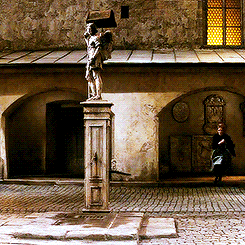
For the most part, the filmmaker used traditional invisible editing, allowing the focus to be on the narrative. However, certain scenes were edited in order to hint to the audience how they should be feeling. There were several instances in which the characters almost seemed to glow. The shots incorporated soft lighting, causing them to take on a glossy and romantic feel. For example, when Rolfe (Daniel Truhitte) and Liesel dance in the gazebo, when the Captain watches his children sing “The Sound of Music,” when the Captain and Maria dance at the party, and when they profess their love for each other again at the gazebo, they are edited in this way. It is important to note that each of these scenes have something in common: love. The filmmaker used this technique to show the audience when the characters felt a sense of love, even if they weren’t aware of it themselves.
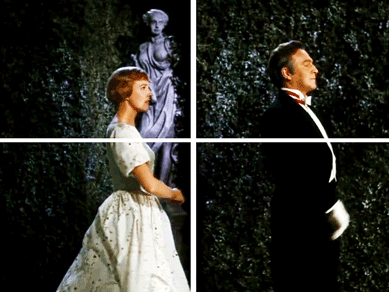
The Sound of Music maintains a pretty joyful tone, especially when Maria is with the children. Her interactions with them are almost always hopeful and festive. It also becomes romantic as Maria and the captain grow closer. However, the film takes a sharp turn after the wedding and the tone changes abruptly. It instantly becomes one of high anxiety. The first shot after the wedding consists of soldiers marching in front of a swastika. The looming threat of Hitler’s reign becomes the focus of the narrative. There are only subtle hints at this threat earlier, such as the complaints about the Austrian flag being hung at the party in the Captain’s house. What was a jolly, musical love story about a family becoming whole again suddenly shifts into a secretive escape from Hitler’s rule and an expression of their Austrian patriotism. The reasoning for this abrupt change is most likely because the story is based in reality. The Von Trapp family’s escape from Austria is central to their story. Although the movie isn’t entirely historically accurate, it would be an injustice to not incorporate this important event in their lives. If The Sound of Music wasn’t based on real events, it would’ve been plausible and even satisfying to end the film with the wedding of Maria and Georg.
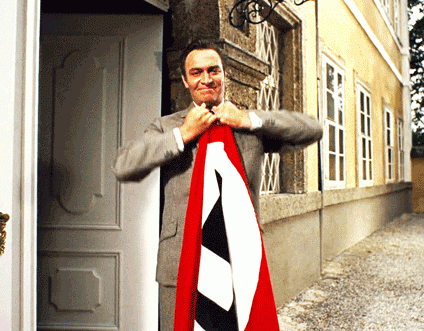
The sound in this film is perhaps the most important part of the story. First, lack of sound was used early on to make an impression. When Maria first walks into the house and looks around, the scene is completely silent. She sees grand but empty rooms and she starts to dance, filling the room with a bit of life, foreshadowing what she was about to do for this family. Apart from her footsteps echoing throughout the house, there is absolutely no sound. Then the captain slams the door open, making a loud noise, alarming the audience. The silence was used so that this specific moment – the moment they meet – would be engrained into our heads. She also breaks the silence at the dinner table. The captain explains to her that they usually don’t speak at dinner and instead just eat their food. But she has too much to say. Later on, the captain explains that it was this dinner in which he fell in love with her – particularly when she screeched as she sat on the pinecone. She had broken the silence in their home. Of course, the actual sound of music was of great significance in the film. The tunes of the songs that they sing are repeated as background music at several points throughout the movie. For instance, the song, “The Sound of Music,” plays when Maria and Georg first kiss towards the end of the film. It’s clear that this song reminds him of Maria as it’s the first song that the kids sang in front of him, thanks to her.
On its own, The Sound of Music is a captivating film with a message that transcends time. When analyzed past the surface it is much more than that. The story becomes a work of art holding endless possibilities.
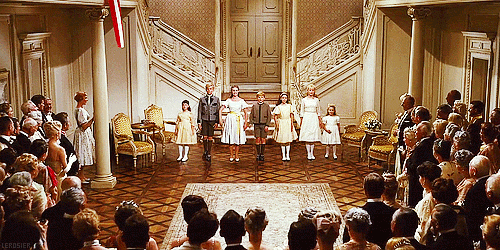
30 June 2019
#sound of music#julie andrews#film#filmreview#filmreviews#christopher plummer#the sound of music#movie#movies
5 notes
·
View notes